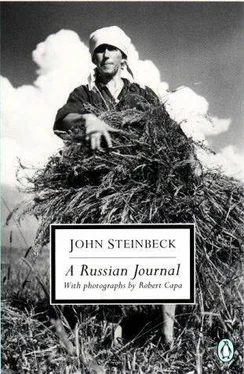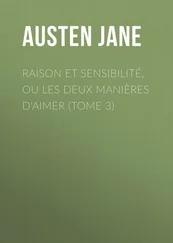John Steinbeck - A Russian Journal
Здесь есть возможность читать онлайн «John Steinbeck - A Russian Journal» весь текст электронной книги совершенно бесплатно (целиком полную версию без сокращений). В некоторых случаях можно слушать аудио, скачать через торрент в формате fb2 и присутствует краткое содержание. Жанр: Классическая проза, на английском языке. Описание произведения, (предисловие) а так же отзывы посетителей доступны на портале библиотеки ЛибКат.
- Название:A Russian Journal
- Автор:
- Жанр:
- Год:неизвестен
- ISBN:нет данных
- Рейтинг книги:4 / 5. Голосов: 1
-
Избранное:Добавить в избранное
- Отзывы:
-
Ваша оценка:
- 80
- 1
- 2
- 3
- 4
- 5
A Russian Journal: краткое содержание, описание и аннотация
Предлагаем к чтению аннотацию, описание, краткое содержание или предисловие (зависит от того, что написал сам автор книги «A Russian Journal»). Если вы не нашли необходимую информацию о книге — напишите в комментариях, мы постараемся отыскать её.
A Russian Journal — читать онлайн бесплатно полную книгу (весь текст) целиком
Ниже представлен текст книги, разбитый по страницам. Система сохранения места последней прочитанной страницы, позволяет с удобством читать онлайн бесплатно книгу «A Russian Journal», без необходимости каждый раз заново искать на чём Вы остановились. Поставьте закладку, и сможете в любой момент перейти на страницу, на которой закончили чтение.
Интервал:
Закладка:
And we said, "That might very well be true, we don't know, but can you give us the name of anyone who has disappeared? Do you know anyone who knows anyone who has disappeared?"
And she replied, "Thousands have disappeared."
And a man with knowing eyebrows and a quizzical look, the same man, in fact, who two years before had given the total battle plans for the invasion of Normandy in the Stork Club, said to us, "Well you must stand in pretty good with the Kremlin or they wouldn't let you in. They must have bought you."
We said, "No, not as far as we know, they haven't bought us. We just would like to do a job of reporting."
He raised his eyes and squinted at us. And he believes what he believes, and the man who knew Eisenhower's mind two years ago knows Stalin's mind now.
An elderly gentleman nodded his head at us and said, "They'll torture you, that's what they'll do; they'll just take you into a black prison and they'll torture you. They'll twist your arms and they'll starve you until you're ready to say anything they want you to say."
We asked, "Why? What for? What purpose could it serve?"
"They do that to everybody," he said. "Why I was reading a book the other day-"
A businessman of considerable importance said to us, "Going to Moscow, huh? Take a few bombs and drop them on the Red sons of-bitches."
We were smothered in advice. We were told the food to take, otherwise we would starve; what lines of communications to leave open; secret methods of getting our stuff out. And the hardest thing in the world to explain was that all we wanted to do was to report what Russian people were like, and what they wore, and how they acted, what the farmers talked about, and what they were doing about rebuilding the destroyed parts of their country. This was the hardest thing in the world to explain. We found that thousands of people were suffering from acute Moscowitis-a state which permits the belief of any absurdity and the shoving away of any facts. Eventually, of course, we found that the Russians are suffering from Washingtonitis, the same disease. We discovered that just as we are growing horns and tails on the Russians, so the Russians are growing horns and tails on us.
A cab driver said, "Them Russians, they bathe together, men and women, without no clothes on."
"Do they?"
"Sure they do," he said. "That ain't moral."
It developed on questioning that he had read an account of a Finnish steam bath. But he was pretty upset at the Russians about it.
After listening to all this information we came to the conclusion that the world of Sir John Mandeville has by no means disappeared, that the world of two-headed men and flying serpents has not disappeared. And, indeed, while we were away the flying saucers appeared, which do nothing to overturn our thesis. And it seems to us now the most dangerous tendency in the world is the desire to believe a rumor rather than to pin down a fact.
We went to the Soviet Union with the finest equipment of rumors that has ever been assembled in one place. And in this piece we insist on one thing: if we set down a rumor, it will be called a rumor.
We had a final Suissesse with Willy at the Bedford bar. Willy had become a full-time partner in our project, and meanwhile his Suissesses got better and better. He gave us advice, some of the best advice we had from anyone. Willy would have liked to come with us. And it might have been a good thing if he had. He made us a super Suissesse, had one himself, and we were finally ready to go.
Willy said, "Behind the bar you learn to listen a lot and not talk very much."
We thought about Willy and his Suissesses a lot during the next few months.
That was the way it started. Capa came back with about four thousand negatives, and I with several hundred pages of notes. We have wondered how to set this trip down and, after much discussion, have decided to write it as it happened, day by day, experience by experience, and sight by sight, without departmentalizing. We shall write what we saw and heard. I know that this is contrary to a large part of modern journalism, but for that very reason it might be a relief.
This is just what happened to us. It is not the Russian story, but simply a Russian story.
CHAPTER 2
FROM STOCKHOLM WE CABLED Joseph Newman, head of the Herald Tribune bureau in Moscow, our estimated time of arrival and settled back content that he would have a car to meet us and a hotel room to receive us. Our route was Stockholm to Helsinki, to Leningrad, to Moscow. We would have to pick up a Russian plane at Helsinki, since no foreign airline enters the Soviet Union. The Swedish airliner, polished, immaculate, and shining, took us across the Baltic and up the Gulf of Finland to Helsinki. And a very pretty Swedish stewardess gave us very nice little Swedish things to eat.
After a smooth and comfortable trip we landed in the new airport of Helsinki, the buildings recently completed and very grand. And there, in the restaurant, we sat down to wait for the arrival of the Russian plane. After about two hours the Russian plane came in, an old C-47, flying very low. Her brown war paint was still on. She hit the ground, her tail-wheel exploded, and she came leaping like a grasshopper up the runway on a flat tail-wheel. It was the only accident we saw during our trip, but, coming at this time, it did little to arouse our confidence. And her scarred and scratched brown paint, and her general appearance of unkemptness, did not contrast well with the brightly shining planes of the Finnish and Swedish airlines.
She bumped and bumbled up to the line, and out of her boiled a collection of American fur-buyers recently come from the auctions in Russia. A depressed and quiet group, who claimed the plane had flown not over a hundred meters high all the way from Moscow. One of the Russian crew climbed down, kicked the flat tail-wheel, and sauntered to the airport terminal. And very soon we were told that we would not take off that afternoon. We would have to go to Helsinki to spend the night.
Capa marshaled his ten pieces of luggage and clucked around them like a mother hen. He saw them into a locked room. He warned the airport officials again and again that they must mount guard over them. And he was never satisfied for a moment while he was away from them. Normally lighthearted and gay, Capa becomes a tyrant and a worrier where his cameras are concerned.
Helsinki seemed a sad, pleasureless city to us, not badly bombed, but considerably shot up. Its hotels mournful, its restaurants rather silent, and in its square a band playing not merry music. In the streets soldiers seemed like little boys, so young, and pale, and countrified. Our impression was of a bloodless place, and a place of little joy. It seemed as though, after two wars and six years of fighting and struggle, Helsinki just couldn't get started again. Whether all of this is true economically we do not know, but that is the impression it gives.
Up in the town we found Atwood and Hill, the Herald Tribune team which was making a social and economic study of the countries behind the so-called iron curtain. They lived together in a hotel room surrounded by reports and pamphlets and surveys and photographs, and they had one lone bottle of Scotch whisky which they had been saving for some unimaginable celebration. It turned out we were it, and the whisky didn't last very long. Capa played a little sad and unprofitable gin rummy, and we went to bed.
In the morning, at ten, we were at the airport again. The tail-wheel of the Russian plane had been changed, but some work was still being done on the number two engine.
During the next two months we flew a great deal in Russian transport planes, and there are points of likeness in all of them, so that this plane may as well be described as representative of all of them. All were C-47's, with brown war paint, remains of lend-lease stock. There are newer transport planes on the fields, a kind of Russian C-47 with a tricycle landing gear, but these we did not fly in. The C-47's are a little run down insofar as upholstery and carpeting go, but their engines are kept up and their pilots seem to be very fine. They carry a larger crew than our planes do, but since we did not get up into the control room we don't know what they do. When the door opened, there seemed to be six or seven people in there all the time, among them a stewardess. We don't know what the stewardess does either. She seems to have no relation to the passengers. No food is carried by the plane for the passengers, but the passengers make up for this by carrying great quantities of food for themselves.
Читать дальшеИнтервал:
Закладка:
Похожие книги на «A Russian Journal»
Представляем Вашему вниманию похожие книги на «A Russian Journal» списком для выбора. Мы отобрали схожую по названию и смыслу литературу в надежде предоставить читателям больше вариантов отыскать новые, интересные, ещё непрочитанные произведения.
Обсуждение, отзывы о книге «A Russian Journal» и просто собственные мнения читателей. Оставьте ваши комментарии, напишите, что Вы думаете о произведении, его смысле или главных героях. Укажите что конкретно понравилось, а что нет, и почему Вы так считаете.











